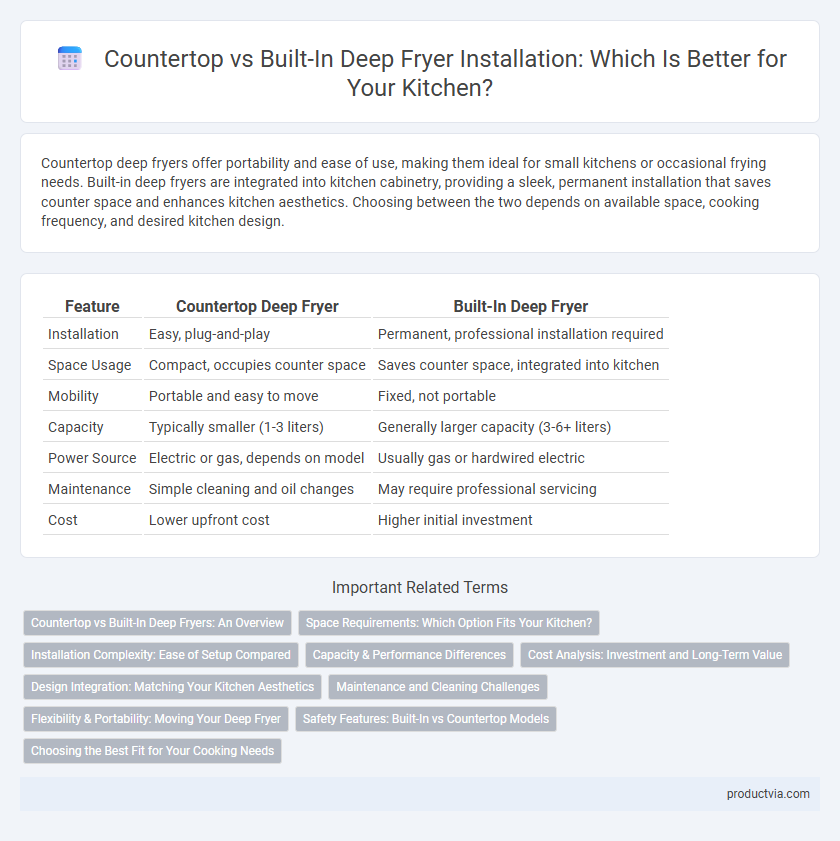Countertop deep fryers offer portability and ease of use, making them ideal for small kitchens or occasional frying needs. Built-in deep fryers are integrated into kitchen cabinetry, providing a sleek, permanent installation that saves counter space and enhances kitchen aesthetics. Choosing between the two depends on available space, cooking frequency, and desired kitchen design.
Table of Comparison
| Feature | Countertop Deep Fryer | Built-In Deep Fryer |
|---|---|---|
| Installation | Easy, plug-and-play | Permanent, professional installation required |
| Space Usage | Compact, occupies counter space | Saves counter space, integrated into kitchen |
| Mobility | Portable and easy to move | Fixed, not portable |
| Capacity | Typically smaller (1-3 liters) | Generally larger capacity (3-6+ liters) |
| Power Source | Electric or gas, depends on model | Usually gas or hardwired electric |
| Maintenance | Simple cleaning and oil changes | May require professional servicing |
| Cost | Lower upfront cost | Higher initial investment |
Countertop vs Built-In Deep Fryers: An Overview
Countertop deep fryers provide easy portability and straightforward installation, making them ideal for small kitchens or limited spaces, while built-in deep fryers offer a sleek, integrated look and save valuable countertop area for professional or home chefs seeking a permanent setup. Countertop models typically feature compact designs with adjustable temperature controls and removable baskets for easy cleaning, whereas built-in units are often more powerful with higher oil capacity and advanced safety features suitable for frequent, large-batch frying. Choosing between countertop and built-in deep fryers depends on kitchen layout, frequency of use, and the desired balance between convenience and performance.
Space Requirements: Which Option Fits Your Kitchen?
Countertop deep fryers require minimal space and are ideal for small kitchens or limited countertop areas, offering portability and ease of storage. Built-in deep fryers demand permanent installation, often requiring dedicated cabinetry or cutouts, which suits larger kitchens with sufficient space and a custom layout. Choosing between countertop and built-in models depends on available kitchen space, usage frequency, and the desire for a seamless, integrated appliance look.
Installation Complexity: Ease of Setup Compared
Countertop deep fryers offer straightforward installation requiring minimal setup, making them ideal for quick deployment in small kitchens or temporary setups. Built-in deep fryers necessitate professional installation with precise measurements and ventilation considerations, suited for permanent kitchen integrations. Choosing between countertop and built-in models hinges on evaluating spatial constraints and installation expertise.
Capacity & Performance Differences
Countertop deep fryers offer smaller capacities, typically ranging from 1 to 4 liters, making them suitable for home kitchens and light commercial use, while built-in models provide larger capacities often exceeding 10 liters, ideal for high-volume cooking environments. Performance-wise, built-in fryers maintain consistent oil temperature more effectively due to integrated heating elements and superior ventilation, resulting in faster cooking times and improved food quality. The choice between countertop and built-in deeply affects operational efficiency, with built-in units supporting continuous use and higher throughput.
Cost Analysis: Investment and Long-Term Value
Countertop deep fryers typically require a lower initial investment, making them suitable for small businesses or limited kitchen spaces, while built-in models involve higher upfront costs due to installation and customization. Long-term value favors built-in fryers as their durability, energy efficiency, and integration into kitchen workflows reduce operational expenses and enhance productivity. Evaluating electricity consumption, maintenance costs, and expected lifespan is critical when comparing overall cost-effectiveness between countertop and built-in deep fryer installations.
Design Integration: Matching Your Kitchen Aesthetics
Countertop deep fryers offer flexibility and portability, easily fitting into various kitchen styles without requiring permanent installation, making them ideal for rental spaces or frequently changing layouts. Built-in deep fryers seamlessly integrate with cabinetry and countertops, providing a sleek, cohesive look that enhances modern kitchen designs and maximizes space efficiency. Selecting the right model depends on your kitchen's design goals, balancing aesthetic consistency with functional convenience.
Maintenance and Cleaning Challenges
Countertop deep fryers offer easy access for maintenance and cleaning, with removable parts designed for quick disassembly and dishwasher compatibility. Built-in deep fryers often have fixed installations requiring specialized tools and space considerations, making routine cleaning more labor-intensive and time-consuming. Regular maintenance of built-in models can be challenging due to limited accessibility, potentially leading to grease buildup and decreased appliance longevity.
Flexibility & Portability: Moving Your Deep Fryer
Countertop deep fryers offer superior flexibility and portability, allowing easy relocation for cleaning, storage, or event use, making them ideal for kitchens with limited space. Built-in deep fryers provide a fixed installation that integrates seamlessly into kitchen countertops, but lack the convenience of mobility once installed. Choosing between these options depends on whether portability or a permanent setup best suits your culinary needs.
Safety Features: Built-In vs Countertop Models
Built-in deep fryers typically offer enhanced safety features such as automatic shut-off systems, heat-resistant insulation, and secure installation that minimizes tipping risks. Countertop models prioritize portability but often have fewer integrated safety mechanisms, relying more on user vigilance and external placement to prevent accidents. Choosing between the two depends on balancing convenience with integrated safety controls and the fryer's intended usage environment.
Choosing the Best Fit for Your Cooking Needs
Countertop deep fryers offer portability and ease of storage, making them ideal for small kitchens or occasional use, while built-in models provide a seamless integration with your countertop, optimizing space and durability for frequent cooking. Consider the size of your kitchen, frequency of frying, and available space to determine whether a compact, movable unit or a permanent, space-saving installation best suits your culinary routine. Energy efficiency and maintenance requirements are also key factors influencing the choice between countertop and built-in deep fryer options.
Countertop vs Built-In for deep fryer installation Infographic

 productvia.com
productvia.com